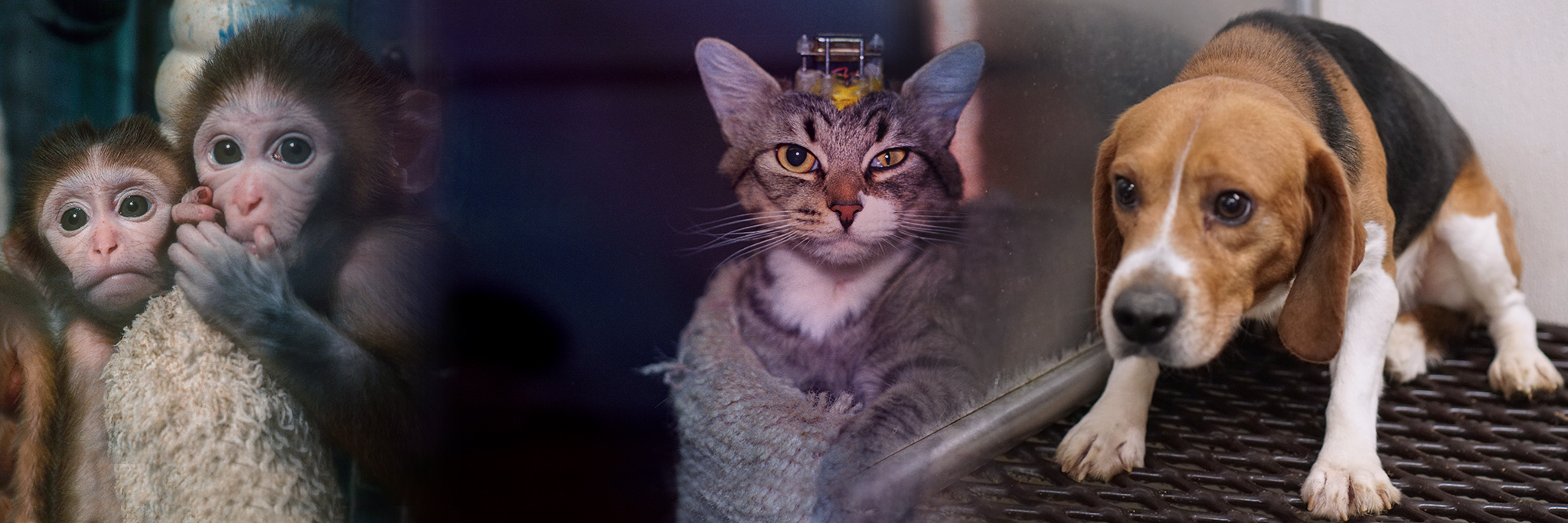UPDATE: Maternal Deprivation Tests Are Stop-And-Go At UW-Madison. After partial respite, a cruel legacy continues at Wisconsin National Primate Research Center. In 2015 the primate lab declares it won't separate baby monkeys from mothers, as reported in UW's student-run newspaper. By 2023 the nearly century-old experiments are back. The catch? “Scientists” don't tear newborns away from mothers. They wait till monkeys are a year old. Animals still live in barren isolation before killed and dissected. Fellow scientists and doctors have said the experiments have no scientific merit, yet UW exploits taxpayer money to sustain them.
Cruelty For The Sake Of Curiosity
2/20/13 » Original KC Action Alert. University Of Wisconsin: Infant monkeys are taken from mothers within 24 hours of birth. To create “adverse rearing conditions,” they're isolated with a live snake and later, a cloth-draped “surrogate peer.” Human Intruder enactments purposely traumatize them. Fear is not a byproduct, but the very goal of deprivation tests during brain development. The monkeys endure brain scans and spinal taps, before killed to dissect their brains. When Harry Harlow first subjected infant monkeys to his infamous "Well Of Despair" a half century ago, he disgraced UW. These studies do not advance medical treatment then or now. Artificial rupture of the mother-baby bond is already well documented. Any perceived need for more data is overshadowed by the unethical nature of the tests. Among mammals, baby primates are especially dependent upon mothers for psychological health. To rob them of any sense of self, then kill them, is animal desecration and exploitation at its worst.
Baby Monkeys Spared?
3/19/15 » Controversial UW Study Will No Longer Take Baby Monkeys From Their Mothers. The Badger Herald, Linnea Langusch. Psychiatric professor Ned Kalin's experiments — for which baby monkeys are removed from mothers, traumatized continuously, and then killed at one year to examine their brains — will proceed without “maternal deprivation.” Tests had measured stress levels when baby monkeys are purposefully frightened by loud noises, human encounters or treats placed over live snakes. “Sujatha Ramakrishna, a pediatric psychiatrist, works with children who have anxiety disorders and is outspoken against Kalin's experiments. She believes the experiments are not an appropriate comparison to disorders in children. The Animal League Defense Fund filed a lawsuit against UW. ‘We are committed to complete transparency in how taxpayer dollars are used to support invasive animal research,’ Kelsey Eberly, lead attorney in the lawsuit, said. Kalin's research has stirred dispute, with a petition against the study acquiring almost 400,000 signatures…”
Cruelty Redux At WNPRC
2023 – 2024 » Maternal Deprivation Tests Make Comeback. In 2023 Dr. Alka Chanda, vice president of laboratory investigations cases for PETA, says UW-Madison's 2023 annual report shows 1,270 monkeys used in experiments, with another 1,090 restrained for future use. Chanda tells The Daily Cardinal (Wisconsin) reporters about three primary forms of alleged animal abuse: isolation, experimentation, breeding. Wisconsin National Primate Research Center plans to remodel contentious experiments from the 1960s, dubbed Harry Harlow's Well (or Pit) Of Despair. Yet again, young monkeys are separated from mothers to strategically traumatize with crude props and intruder enactments. Over half of century of similar experiments show that baby monkeys self-mutilate, pace and rock in cages, continually back-flip and exhibit other stereotypies symptomatic of elevated stress hormones, frustration and despair.
Yet images documented at WNPRC are “typical stereotypies and indicators of fear found in [all] captive monkeys raised in impoverished laboratory environments,” says John P. Gluck, Ph.D., Emeritus Professor, Psychology Department, University of New Mexico and Affiliate Faculty, The Kennedy Institute of Ethics, Georgetown University. In response to PETA footage of monkeys isolated in bleak cages, babies removed from mothers, and male monkeys’ genitals electroshocked — Dr. Gluck ponders where is the science? “These behaviors are not examples of unusual circumstances… [but rather] a picture of baseline distress and suffering experienced by animals in the captive lab environment.”
As recently as 2023, Chanda, PETA's lead for lab investigations, describes monkeys Princess and Cornelius as “showing signs of depression” after segregated from mothers by age one. In The Daily Cardinal's A UW-Madison Research Lab Is Under Fire, she says monkeys live in metal cages with a dangling mirror or one plastic ball. Under “extreme psychological distress,” the hairless female monkey has resorted to Trichotillomania, or compulsive hair-pulling as a form of self-injury. “Long-term confinement of a caged animal is comparable to solitary confinement in human prison systems,” notes Sujatha Ramakrishna, M.D., Pediatric Psychiatrist. “It is not surprising that extreme environmental deprivation would result in self-injury.”
Monkeys are so severely compromised that the results are biologically/medically/scientifically useless. Because the monkeys are so very anxious, and/or physically traumatized, their entire biological/psychological systems are altered to the point where they cannot be a “model” of anything other than … trauma. The supposed “greater good” that is the usual laboratory rhetoric fails. Evidence is right before our eyes that this isn't good science, as well as being critically unethical science. Barbara J. King, Ph.D., Emerita Professor of Anthropology, College of William & Mary


















